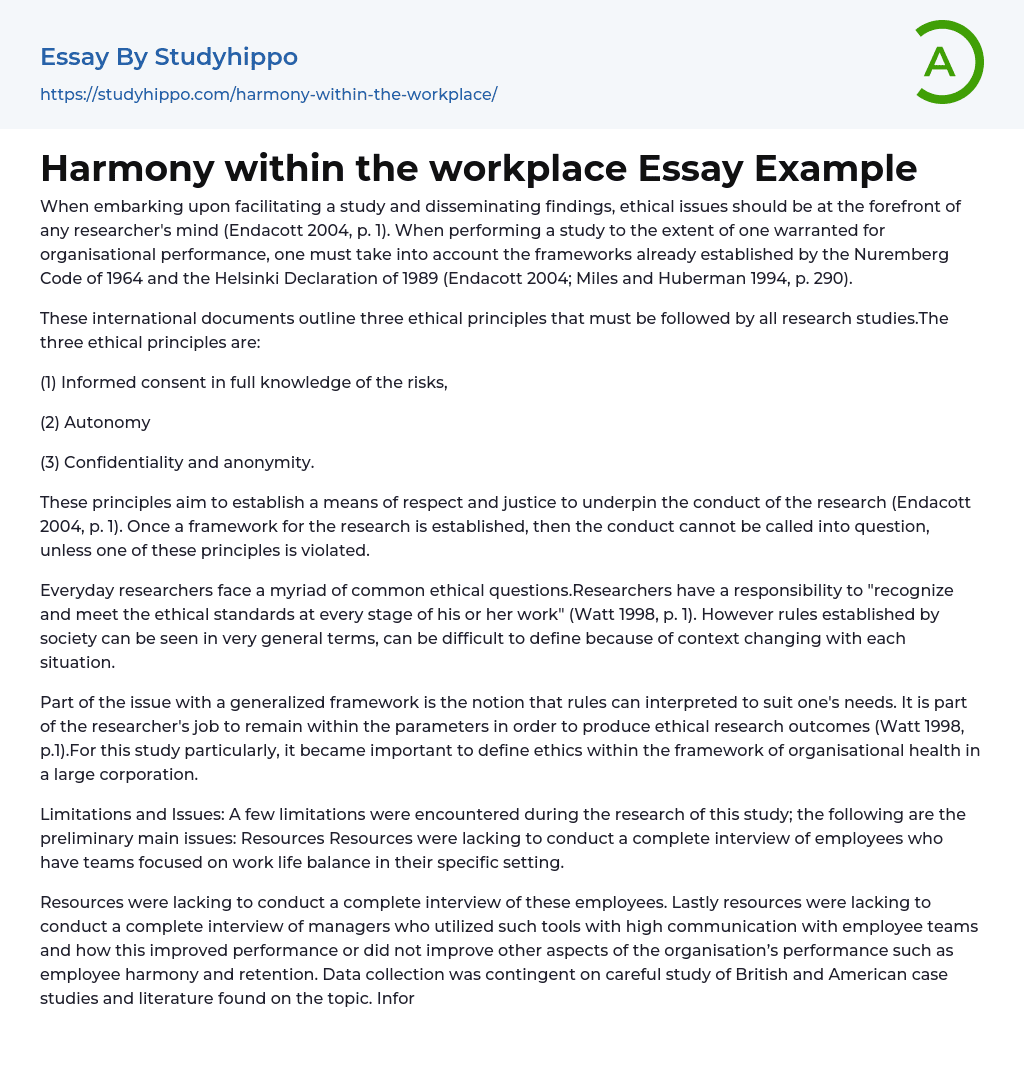When embarking upon facilitating a study and disseminating findings, ethical issues should be at the forefront of any researcher's mind (Endacott 2004, p. 1). When performing a study to the extent of one warranted for organisational performance, one must take into account the frameworks already established by the Nuremberg Code of 1964 and the Helsinki Declaration of 1989 (Endacott 2004; Miles and Huberman 1994, p. 290).
These international documents outline three ethical principles that must be followed by all research studies.The three ethical principles are:
(1) Informed consent in full knowledge of the risks,
(2) Autonomy
(3) Confidentiality and anonymity.
These principles aim to establish a means of respect and justice to underpin the conduct of the research (Endacott 2004, p. 1). Once a framework for the research is established, then the conduct cannot be called into question, unless one
...of these principles is violated.
Everyday researchers face a myriad of common ethical questions.Researchers have a responsibility to "recognize and meet the ethical standards at every stage of his or her work" (Watt 1998, p. 1). However rules established by society can be seen in very general terms, can be difficult to define because of context changing with each situation.
Part of the issue with a generalized framework is the notion that rules can interpreted to suit one's needs. It is part of the researcher's job to remain within the parameters in order to produce ethical research outcomes (Watt 1998, p.1).For this study particularly, it became important to define ethics within the framework of organisational health in a large corporation.
Limitations and Issues: A few limitations were encountered during the research of this study; the following are the preliminary main issues: Resources Resource
were lacking to conduct a complete interview of employees who have teams focused on work life balance in their specific setting.
Resources were lacking to conduct a complete interview of these employees. Lastly resources were lacking to conduct a complete interview of managers who utilized such tools with high communication with employee teams and how this improved performance or did not improve other aspects of the organisation’s performance such as employee harmony and retention. Data collection was contingent on careful study of British and American case studies and literature found on the topic. Information and data gathering was conducted in the best way possible without actual physical interviewing employees, as there was the issue of time and travel.
First this section will define what exactly work life balance is and how it has been absorbed into organisational culture. Secondly this section will explore the relationships between work life balance being an approach that leaders can take to not only maximise performance and therefore create competitive advantage but also how such benefits as a work life balance policy can optimise employee retention and create a new level of harmony within the workplace. We live in an age where time is short. Telecommunications and other innovations have caused the work place to perform at the speed of light as well as remain at optimum performance levels.
Due to many changes in society expectation, modern convenience has made it mandatory for both men and women to work in the business world. The cost of living has increased as the hours needed to keep up with the Joneses have increased as well. It is a lose-lose situation for both management and employees
alike.While many organisations in the United Kingdom and other western nations have seen the need to increase productivity in order to increase competitive advantage, they have also seen a need to value flexibility and creativity. Tory Johnson writes, “Employers know that offering flexibility helps companies to recruit and retain the best talent” (2006, par.1). Still this does not change the fact that performance in the old sense of business practice comes down to the numbers. Managers, in other words, believe that productivity is measured by hours in the office (Johnson 2006, par. 1).
- Values of Life essays
- Ethical dilemma essays
- Normative Ethics essays
- Virtue Ethics essays
- Belief essays
- Deontology essays
- Moral essays
- Virtue essays
- Work Ethic essays
- Working Time essays
- Collective Bargaining essays
- Organizational Structure essays
- Organizational Culture essays
- Workstation essays
- Sweatshops essays
- Working capital essays
- Job Satisfaction essays
- Working Class essays
- Hard Work essays
- Workforce essays
- Corporate Culture essays
- American Dream essays
- Barriers To Entry essays
- Capitalism essays
- Central Bank essays
- Compensation essays
- Consumerism essays
- Economic Development essays
- Economic Growth essays
- Economic Inequality essays
- Economic System essays
- Economy essays
- Employment essays
- Export essays
- Finance essays
- Free Trade essays
- Gross Domestic Product essays
- Human Development essays
- Income Inequality essays
- Industry essays
- Inflation essays
- International Business essays
- International Trade essays
- Macroeconomics essays
- Materialism essays
- Max Weber essays
- Microeconomics essays
- Minimum Wage essays
- Monetary Policy essays
- Monopoly essays




